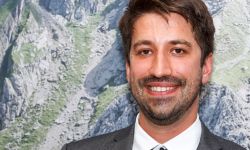
Experimental physicist Petar Jurcevic, a former member of Rainer Blatt’s research group, will receive the IQOQI Dissertation Prize 2018. This is already the fifth time that this prize, valued at 1,000 Euro, will be awarded. It honors scientifically outstanding accomplishments in the field of quantum physics.
The Dissertation Prize is awarded by the Institute for Quantum Optics and Quantum Information (IQOQI) and rewards promising junior physicists for outstanding accomplishments. The prize is given to graduates of a PhD program undertaken at the University of Innsbruck for scientifically outstanding achievements in the field of quantum physics. This year’s award will go to Petar Jurcevic from Rainer Blatt’s research group at the Institute for Experimental Physics, after Philipp Schindler and Simon Stellmer received the prize in 2013, Alexander Glätzle in 2014, Albert Frisch in 2015 and Florian Meinert in 2016. Petar Jurcevic will receive the award for his work in the field of quantum computation and many-body physics with trapped ions.
Experimental investigation of quantum computation
Three major aspects of quantum information processing were experimentally investigated by Petar Jurcevic: quantum correlations, the measurement-based quantum computational model and quantum simulation of interacting many-body systems. In the first part of his thesis he addresses quantum discord, a wide class of quantum correlations suitable for various quantum informational tasks. Quantum discord is not only more resilient to experimental noise, moreover, certain noisy processes generate quantum discord from initially completely uncorrelated states. These findings are remarkable insofar as the best-known quantum correlation, i.e. entanglement, is very fragile when interacting with the environment. “Our results highlight that noise is not in general detrimental and, for certain tasks, could be used to boost quantum information processing”, says Jurcevic. In his work he also investigated the so-called measurement-based quantum computation model. “In this model one starts with a highly entangled state, a graph state, and performs single qubit measurements with feedforward to harness the quantum resources and to advance the computation”, the awardee explains. He deterministically created different cluster states and showcased the elementary building blocks of a universal quantum computer. It was demonstrated that larger states indeed offer better protection against noise, despite the larger overhead in state preparation. The last part of his thesis consists of two experiments regarding quantum simulations of spin chains with variable interaction ranges.
About
Petar Jurcevic was born in Split, Croatia, in 1986. He studied nanoscience and physics at the University of Basel. After graduation in 2010 he worked at the Centre Suisse d'Electronique et de Microtechnique for one year and later joined Rainer Blatt’s research group at the Institute of Experimental Physics at the University of Innsbruck. Jurcevic finished his PhD in 2017 and is now working at the IBM Research Center in Yorktown Heights, New York. In 2018 he was awarded the Science Prize of the Tyrolean Chamber of Commerce and a research prize of the Swiss Physical Society.